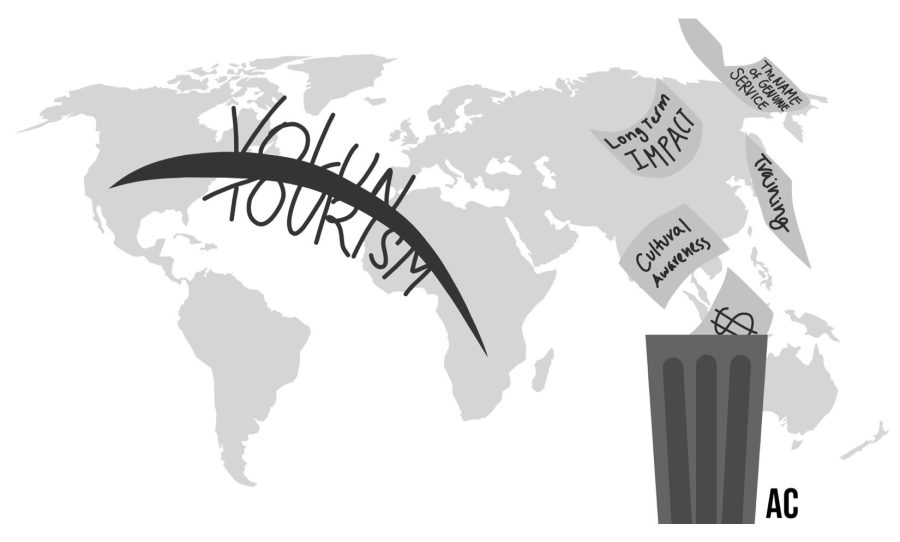At 6 a.m. in Bonao, a small city in the Dominican Republic, senior Jennifer Xu prepares for the day’s project: a mural. Xu, who had woken up before everyone else, paints outlines on a wall tainted by graffiti and establishes a foundation for the piece. As the sun rises, students from abroad and local community members begin to trickle in and add colorful strokes of their own.
Like Xu, many Paly students participate in service projects abroad each year, traveling to countries thousands of miles away. Participants spend several weeks contributing to temporary interventions generally intended to improve the educational, health, environmental and economic aspects of underprivileged communities. This international short-term volunteer work that has recently gained popularity is known as “voluntourism.”
Though “voluntouring” may appear philanthropic and seem to be an admirable way of improving less privileged communities, there are many flaws in this emerging trend which students should consider before opting to participate.
First, these trips are often inefficient, given that projects are delegated to students who may have less experience than needed. Many organizations lack a standardized or formal requirement for the amount of experience a “voluntourist” must have, and do not preface trips with sufficient training.
Xu, who tutored children in English at an orphanage called “La Fundación Un Nuevo Futuro,” said the organization she registered for the trip through, Global Glimpse, did not prepare participants thoroughly enough. Global Glimpse did not respond to requests for an interview.
According to Xu, she thought the organization should have provided better training, as students were given sparse teaching handbooks and she had to rely more on her pre-existing knowledge of English grammar.
Moreover, the language barriers that “voluntour” trips often involve are a difficult obstacle to work with. A number of organizations do not require fluency in the native language of the host community, which is an especially prominent issue when participants’ jobs are to teach children a new language.
Additionally, while experiences for the individual student volunteers may often be valuable, the host communities do not always reap the same benefits.
One factor that may negatively impact the community served is that the program and work are usually temporary.
The program Xu attended lasted just two weeks, which was not sufficient enough to thoroughly teach the children. Furthermore, Xu said the constant arrival and departure of waves of student “voluntourists” can negatively impact the community and the children’s social and emotional well-being. According to Xu, the children she tutored became emotionally attached to her throughout the two weeks. She said it was disturbing to watch the children cry when participants left, especially since they were orphans.
Senior Ashley Hitchings, who has also participated in service trips abroad, is also concerned about the effect of the trips’ short duration. She has gone to both Lijiang and Yuanyang in the Yunnan province of China over the past two summers through the Peach Foundation, volunteering as an English teacher for children who are unable to access quality education. Though Hitchings said the Peach Foundation manages a sustainable cycle of tutoring for their host communities, she recommends participants be conscious of the effects a temporary trip without a sufficient follow-up may have.
According to Hitchings, “voluntourists” can disrupt local people’s lives. She said longevity is important, and when students from abroad show up in a whirlwind and quickly disappear, the community is negatively impacted. Ensuring that participants’ actions are effective and their changes are enduring is important.
Another aspect that may damage the host community is the possible displacement of community members. Hitchings believes participants’ work should fill a need in the host community that is currently not being met, and it is important that participants arrive with the proper cultural context.
Rather than focus on student participation, organizations should promote local community members’ contribution to these projects given that they are more familiar with their community’s needs and can maintain the sustainability and effect of efforts once participants leave. Finally, in addition to having negative consequences on host communities, “voluntourism” also usually caters to only high-income students who can afford to travel abroad.
Fees are not only expensive, often reaching up to thousands of dollars per person. This may prevent students of lower socioeconomic status from embarking on these trips and possibly gaining valuable experiences, as scholarships are often limited.
Overall, “voluntouring,” though seemingly generous, often has negative consequences for both student participants and host communities, including lack of training, disruptive actions and high registration fees.
However, genuine, comprehensive community service, local or abroad, that serves both volunteers and community members well should not be tainted by the effects and flaws of certain “voluntour” organizations and practices.
For example, according to Amigos Peninsula Chapter President Ellen Curran, while many “voluntourism” organizations only provide a glimpse of the community, Amigos is a 54-year-old volunteer abroad program that allows for full cultural immersion of participants in their host communities.
Amigos not only offers scholarships and allows students to cover partial registration fees through fundraising or selling products, in addition the program provides 50 hours of training and seven hours of direct community service beforehand, thoroughly preparing students in regards to health, safety, cultural awareness and understanding.
Curran said the main difference between Amigos and many other organizations is that Amigos does not arrive at host communities with a specific, already planned project.
The program analyzes the communities’ needs, promoting cooperation between student participants and local community members during project brainstorming.
Therefore, before embarking on a “voluntour” trip, students must thoroughly consider the positives and negatives of the program they are attending and develop a strong cultural awareness of the host community.
Though participants may obtain valuable experiences, these experiences can come at a cost — both in terms of registration fees and, especially, possibly doing more harm than good.

